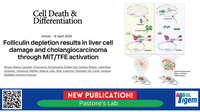Folliculin depletion results in liver cell damage and cholangiocarcinoma through MiT/TFE activation
Authors: Bruno Maria Custode, Francesco Annunziata, Felipe Dos Santos Matos, Valentina Schiano, Veronica Maffia, Milena Lillo, Rita Colonna, Rossella De Cegli, Andrea Ballabio, Nunzia Pastore.
Year: 2025
Sources: Cell Death & Differentation
Abstract:
Mutations in the tumor suppressor gene Folliculin (FLCN) are responsible for Birt-Hogg-Dube’ (BHD) syndrome, a rare inherited condition that predisposes affected individuals to skin tumors, pulmonary cysts, and kidney tumors. FLCN regulates key cellular pathways, including TFEB, TFE3, and mTORC1, which are critical for maintaining cell homeostasis. Loss of FLCN leads to both hyperactivation of mTORC1 and constitutive activation of TFEB and TFE3, contributing to tumorigenesis. While previous studies showed that Flcn liver-specific conditional knockout (FlcnLiKO) mice are protected from developing liver fibrosis and damage upon high-fat diet exposure, the potential role of FLCN loss in liver carcinogenesis remained unexplored. Here, we demonstrate that hepatic loss of FLCN in mice results in cancer associated with inflammation and fibrosis with features of cholangiocarcinoma (CCA). This phenotype emerges in mice over 90-week-old, with a male predominance. Moreover, FlcnLiKO mice are more prone to develop diethylnitrosamine (DEN)- or 3,5-diethoxycarbonyl-1,4-dihydrocollidine (DDC)- induced liver tumors with heterogenous histological features. Notably, depletion of TFE3, but not TFEB, in the liver of FlcnLiKO mice fully rescues the cancer phenotype and normalized mTORC1 signaling, highlighting TFE3 as the primary driver of liver cancer and mTORC1 hyperactivity in the absence of FLCN.
Category: journals

